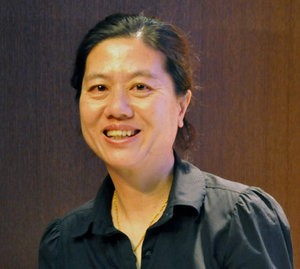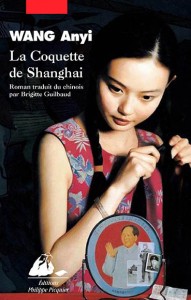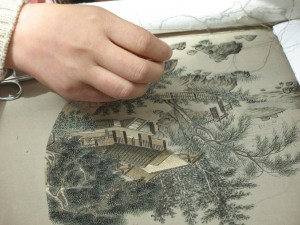 Wang Anyi is a prominent writer who is a symbol of Shanghai literature. Now older than sixty, she has written more than one hundred and fifty short stories and novels, seven of which were translated into French with Philippe Picquier.
Wang Anyi is a prominent writer who is a symbol of Shanghai literature. Now older than sixty, she has written more than one hundred and fifty short stories and novels, seven of which were translated into French with Philippe Picquier.
She is the author of one of the masterpieces of contemporary Chinese literature, “The Song of Everlasting Sorrows” (1) which was crowned by the Mao Dun Prize in the year 2000 and which, a year later, allowed her to be elected Chairwoman of the Writers’ Union of Shanghai.
Her ability to renew herself and the importance of her work made her obtain in 2016 the Newman Prize awarded every two years by the University of Oklahoma and an international jury that crowned Mo Yan, Han Shaogong and the Taiwanese Yang Mu and Chu Tien-wen!
– Her mother, an actress:
Her novel “La coquette de Shanghai” (2), translated into French with her usual elegance by Brigitte Guilbaud, tells us of the life of Xiao Mingming, an opera singer who took refuge in Hong Kong during the Sino-Japanese war. It is also the story of her daughter Xiaoqiu , born 18 months after her divorce from Yu Zihan of whom she had two children. He had the bad idea to deceive her with a colleague from the printing press where he worked, a colleague condemned like him to prison for debt!
Xiaoqiu will suffer from being a fatherless child. Her relations with her brother and sister will be very distant even after the departure of the brother who, during the Cultural Revolution, vigorously denounces his own mother.
As in most novels by Wang Anyi, historical events are not handled as such, they have only a minimal place. She claims it and maintains that as a woman, she prefers to write about everyday life and that her main talent as a writer is her ability to observe. This being so, if one does not have a prior knowledge of the Cultural Revolution and the movement of sending young people “to the countryside”, one cannot really understand the history of the characters.
– A girl sent to the countryside:
 Xiaoqiu did wake-on parts in her mother’s theater and later, during her studies, was a member of an artistic propaganda team and then of a group of tambourine players. She is barely fifteen years old, very beautiful, “cat eyes” and physical features that one notices.
Xiaoqiu did wake-on parts in her mother’s theater and later, during her studies, was a member of an artistic propaganda team and then of a group of tambourine players. She is barely fifteen years old, very beautiful, “cat eyes” and physical features that one notices.
She is sent to the countryside to be “re-educated” by the peasants at the same time as He Minwei, the brother of a college friend. Relations with peasants are not bad, it is a rich area close to Shanghai. Although young people are not very effective in their agricultural tasks, they are not ill-treated as in more backward areas.
Nevertheless, if one wants a less idyllic idea of the life of “educated youth”, it is better to read Michel Bonnin’s reference book “Lost Generation” (3) This period in the countryside is most often a fundamental event in the history of these young people and that does not emerge from the novel.
- A neutral tone to observe the characters:
The composition is simple, chronological, without any particular research. Limited dialogues and little emotion on the part of the narrator; We do not feel a passion for the characters. There are some dramatic elements but accidents are treated in an impersonal way. Emotions and reactions of the characters are the motions of the narrative.
The secondary characters are not really developped while some of them like Lao Dage, Xiao Mingming’s friend, could be interesting. Shanghai is the essential figure in many texts of Wang Anyi; here this is not the case, the mother lived in Hong Kong and daughter in the countryside in Anhui Province.
We are confused by the character of the mother, very cold with Xiaoqiu while she could have been proud of her beauty and qualities; no jealousy but perhaps the difficulty of being the mother of a child born of unknown father. However, it was her mother’s skillful intervention that will allow Xiaoqiu to leave her village. Xiao Mingming tries to control her life while Xiaoqiu is affected by events especially in her sentimental life and her relationship with He Minwei.
– A writer capable of surprising us:
The historical novel “Scent of Heaven” published in 2011 won a year later the “Dream of the Red Mansion prize” awarded every two years by an independent jury of academics selected by the Baptist University of Hong Kong.
In the 16 th and 17 th centuries, four generations of women from the Shen family developed an embroidery workshop and an own style that became famous. A family saga inspired by the Gu family, which imposed long historical researches to the author.
A novel which has been praised, being translated for Penguin by Andrea Lingenfelter. As the author says: “What attracted me most were the fascinating stories behind Gu embroidery, the rise and fall of a wealthy family, the struggle of the family to earn a living with their embroidery skills and the revival of the Gu embroidery as a form of art “.
It is also worth mentioning recently published short stories, an essential part of the work of Wang Anyi. “Dark Alley“, translated by Canaan Morse, is a beautiful text about the traditional neighborhoods of Shanghai with their narrow, bustling alleys where groups of children play, grow, argue and discover the world of adults. A short story without any spectacular event or fall but which keeps you long under its spell …
Bertrand Mialaret
(1) Wang Anyi, “The Song of Everlasting Sorrows,” translated by Michael Berry and Susan Chan Egan, Columbia University Press, 2008.
(2) Wang Anyi, “La Coquette de Shanghai,” translated by Brigitte Guilbaud. Philippe Picquier, 2017, 240 pages, 21 euros.
(3) Michel Bonnin, “Lost Generation”, the movement of the educated young people sent to the countryside in China, 1968-1980. Editions de l’EHESS, 2004, 490 pages; also translated into English and Chinese.
(4) Wang Anyi, “Dark Alley,” translated by Canaan Morse. Paper Republic 5/5/2016.






